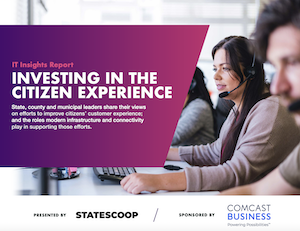- Sponsored
- State
Where public agencies are investing to improve customer service

Technology advancements and the increase in digital tools offer the potential to improve the delivery of public services. The customer and citizen experience (CX) matters—and like counterparts in the private sector, state, county and municipal government agencies recognize that providing a better and seamless user experience is critical. But offering integrated services that citizens can access at any time across various channels is just one aspect of CX. Public sector leaders need to also consider the underlying infrastructure and applications to give employees the tools and information necessary to respond quickly and efficiently to citizens’ needs, a new study suggests.
“Investing in the Citizen Experience” takes a fresh look into public sector agencies’ progress around CX. The study, produced by StateScoop and sponsored by Comcast Business, also explores perceptions about the role of broadband and wireless infrastructure and network connectivity in delivering customer services—and the investment strategies officials are considering to improve the delivery of public services.

Among the key findings:
Visibility gaps impact CX success
Customer and citizen experience (CX) is integral to modern service delivery. While 3 in 4 state agency respondents — and 7 in 10 county and city agency respondents —collect CX information, only about half know whether requests were resolved satisfactorily. Fewer than half gather information on the ease of connecting with a customer service representative, suggesting agencies still have a limited view of how their underlying infrastructure contributes to or inhibits CX’s success. Measuring and having visibility into the CX success and citizen satisfaction allows public sector IT leaders to set priorities and reinvigorate efforts over time as needs change.
Tackling annual customer requests means leveraging new digital tools
Governmental agency respondents reported that they respond to one-third of customer service requests in person and another third by phone or call centers — with only 12% using online live, or robotic, chat — suggests that agencies still have a long way to go to take advantage of more modern infrastructure and AI-assisted tools to facilitate CX. Leaders should take a closer look at where their innovation gaps lie to develop solid strategies that manage the influx of requests and ensure citizen satisfaction.
CX relies on network infrastructure and performance
Managing that influx of customer service requests through multiple channels means that advanced network infrastructure and performance are critical to help improve CX. Although a majority of respondents maintain that their call center platforms, network performance, and broadband and wireless capacity meet common requirements, approximately 1 in 5 respondents say they do not — particularly those serving larger populations. Customer expectations, meanwhile, continue to evolve. Consequently, so must the CX infrastructure and applications agencies rely upon.
Prioritizing strategies and investments that enhance the overall CX
Public sector officials appear mindful that they must invest in infrastructure to improve CX. County and city respondents say they are giving the highest investment priority to faster, higher-capacity broadband connectivity. State respondents, meanwhile, say they are concentrating on cloud-based contact centers. But respondents at the state, county and city level all say that faster connectivity, data analytics tools, and network security tools are critical elements in their CX investment plans over the next 12-24 months.
Download the full study, “Investing in the Citizen Experience,” for detailed findings, including breakouts tables on how state, county and city agency respondents— and respondents by population served— occasionally see things differently in the progress agencies are making in improving CX and service delivery.
This article was produced by Scoop News Group for StateScoop and sponsored by Comcast Business.





